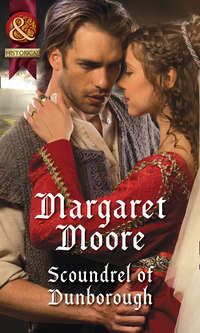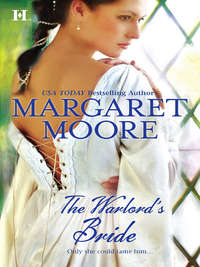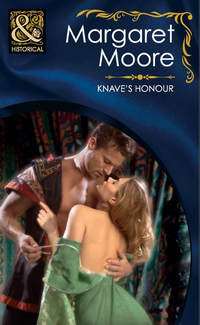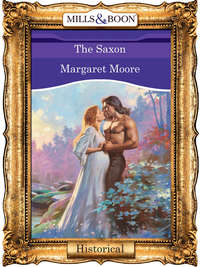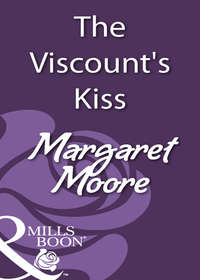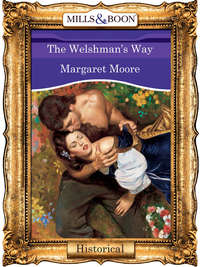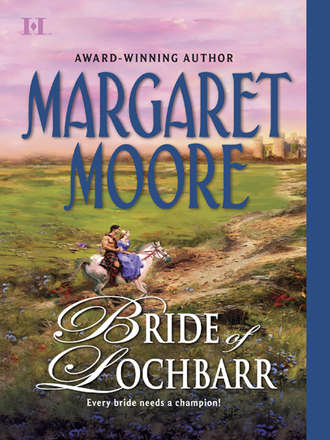
Полная версия
Bride of Lochbarr
“This land was given to him by Alexander and you ought to remember that before you go charging the man with theft.”
“I’m not going to charge him with theft. That’ll be for Father to do.”
Another man spoke from within the group of Scots. “The Norman’s not the only one thinking he deserves to rule the world.”
Adair didn’t have to guess who it was, and he answered without looking over his shoulder. “Not the world, Cormag. Just our clan, as the heir chosen by my father and our clansmen.”
Cormag didn’t reply, and how could he? That was the truth, and the whole clan knew it. Nobody had ever considered Cormag Mac Taran suitable for taking Seamus Mac Taran’s place as chieftain of the clan and thane of Lochbarr, except Cormag himself.
“I’ll try not to curse the man outright,” Adair said to his brother as they trotted up the steps of the massive stone hall. “Will that content you?”
“I suppose it’ll have to,” Lachlann grudgingly conceded as they followed the Norman and their chieftain toward a dais at the end of the hall, past the central hearth. The chamber was full of people, including several foot soldiers, armed and armored.
There were also large, scarred trestle tables leaning against the walls, with benches in front of them, and rushes sprinkled with rosemary and fleabane covering the stone floor, muffling their footsteps and lightly scenting the air. Hounds skulked about, studying the newcomers warily, just as the soldiers at the gate had.
King Alexander must have paid the Norman with more than land for his services, or else the mercenary Sir Nicholas had come from a more wealthy family than they knew.
“The rest of us will have to stand like servants,” Adair noted under his breath when they reached the dais, where two large and ornately carved chairs stood.
“I feel like one wi’out my claimh mor,” Roban said, rolling his brawny shoulders as if seeking the huge sword’s comfortable weight on his back, where he usually carried it.
“If it comes to a fight, you won’t need it. You could probably take half this lot with your bare hands,” Adair replied, eyeing his friend who was six foot tall, and weighed fifteen stone after a day’s fasting.
“With a dirk, you could likely take them all without breaking a sweat,” Roban replied with a chortle.
“’Twas right to leave our claimh mors at the gate, since we come in peace,” Lachlann said under his breath. “Now be quiet, the pair of you. I want to hear what Father and the Norman say to each other without you muttering in my ear.”
“Welcome to my hall, Seamus Mac Taran,” Sir Nicholas said in French as the chieftain took his seat.
Then the Norman overlord barked out an order for wine. A female servant, young and pretty, with light-brown hair and green eyes and a mole on her right breast, nodded and scurried away like a frightened mouse, clearly terrified of her master.
Sir Nicholas was obviously fast with a blow or a kick if a servant didn’t move quickly enough to suit him, Adair thought, his disgust mounting. And perhaps he used his female servants to serve other needs as well.
The loathsome lout. Any man who forced a woman was no man at all, but a foul beast, and deserved to be treated like one.
“What brings you to call at Beauxville today?”
Adair’s lip curled. His father had been a warrior and clan chieftain for thirty years, yet this Norman addressed him as if he were a child. And this place was Dunkeathe, not Beauxville.
“A dozen cattle are missing from the south meadow of our land,” Seamus said.
And you and your men have stolen them, Adair silently added.
“How unfortunate,” the Norman calmly replied. “Outlaws are everywhere these days.”
Including right in front of me.
“Indeed they are,” Seamus agreed just as calmly. “But no Scot would steal from the Mac Tarans. They know if they are hungry, they have but to come to my hall and they’ll be fed. We Scots understand hospitality.”
That honest answer and sly rebuke brought a smile to Adair’s lips. But the Norman, dolt that he was, didn’t comprehend. Or if he did, he felt no proper shame.
“What did yer father say?” Roban asked in a whisper. Adair and Lachlann knew French, their father having insisted they learn it, but the rest of their clansmen did not.
“He told the bastard about Scots’ hospitality,” Adair explained.
“So you don’t suspect your fellow countrymen of this alleged crime?” Sir Nicholas inquired of the chieftain.
Adair’s temper rose even more at the man’s tone, as if Scots should, of course, be the first to be suspected, although it was the Normans who were coming to Scotland and taking everything they could.
“It’s possible, I suppose,” Seamus said with a shrug. Then he smiled in a way that had chilled many an enemy’s bones in days gone by. “But the Scots also know that the Mac Tarans will punish those who steal from them.”
“I’ve heard you people take the law into your own hands,” the Norman replied.
At last Adair saw a spark of anger in his father’s eyes.
“As a thane with a charter from the king, and chieftain of the clan, I have the right to uphold the law.”
“You have a charter?” The Norman sounded surprised. “I thought you Scots didn’t hold with such legal documents, that the clan held the land in community.”
“I hold the charter for the clan, because if I did not, there would be nothing to prevent a foreigner from getting our lands.”
“Your own king gives charters. Is that not his right?”
“Of course it is,” Seamus said, his voice placid once again. “He gave me our charter, as he gave you your reward. I merely point out that I have it, and because I do, I have the right to punish offenders who steal from me and my clan. So I will, when they are caught.”
The servant with the mole on her breast reappeared, carrying a tray bearing two goblets. She offered one first to Sir Nicholas, who frowned and gestured at Seamus.
Her hands, already shaking, could barely hold the tray steady as she turned toward the Scots chieftain. She probably feared a beating for this mistake.
Adair hurried forward and grabbed the tray out of the startled woman’s hands. “It’s a Scots tradition that a guest serve the first drink in his host’s hall,” he lied, trusting to the Norman’s ignorance of local customs as he handed a goblet to Sir Nicholas.
Who was, judging by his unexpectedly shrewd expression after his initial surprise had passed, perhaps not so ignorant of Scots ways as Adair had assumed. Nevertheless, the Norman accepted the goblet without comment. So did Seamus, who regarded his son with a warning eye.
Paying heed to Lachlann’s old woman’s worrying was one thing; a look like that from their father’s gray eyes was another. But he didn’t regret his impetuous act when he saw the grateful look from the serving wench, and remembered the surprise in the Norman’s.
Adair handed the tray back to the young woman and returned to his place with the rest of his clansmen.
“You can go,” Nicholas snapped at the maidservant.
“This bold fellow is my eldest son, Adair Mac Seamus Mac Taran,” Seamus explained to the Norman as the young woman fled. “My clan has chosen him to be thane and chieftain when I die.”
As Sir Nicholas ran a measuring gaze over him, Adair wondered if the Norman had heard that Adair Mac Taran had never been beaten in a fight, whether with arms or bare-handed, since he was ten years old—after he had seen what Norman soldiers could do.
Sir Nicholas looked back at Seamus and raised a brow. “Chosen?”
“Aye, although he’s my son, we still hold to the old ways. I pick who will succeed me, and my clansmen must agree. I have, and they did.”
“And all are happy with that choice?”
“They accept it, and thus it shall be,” his father answered with a smile. “Loyalty to the clan comes first above all things.”
“Not loyalty to your king?”
“If a chieftain’s loyalty is pledged to the king, so is the clan’s, without fail. Since I swore my oath to Alexander when he gave me the charter, every man in my clan would die for him.”
“Whether there was a reward for such service promised or not,” Adair added, earning him another sharp look from his father, and a suspicious one from the Norman.
“My son is a bit hot-tempered, my lord,” Seamus said. “Something that stands him in good stead in a fight, but leads to misunderstanding at other times.”
“I see. And I sympathize. My brother is the same.”
There were two of them?
Seamus smiled as if he and this Norman interloper were good friends. “A trial at times, yet worth the trouble in a fight, eh?”
The Norman actually laughed, a harsh sound like a crow, but a laugh. “If you were to come to Henry and accuse him or his men of theft, he would have his knife at your throat before you’d finished speaking.”
And soon after that, he would be dead, Adair silently vowed.
“I haven’t come here to accuse you or your men of theft,” Seamus replied evenly. “I came to warn you that there may be outlaws afoot. I also came to tell you that we intend to mount more patrols on our land.”
His father’s intent suddenly became more clear, and acceptable. Not as good as telling the Norman they knew his men had taken the cattle—the hoof-prints of the beasts had showed they’d been herded toward Dunkeathe—but his father was a wise and patient man, so perhaps this was the better course, even if it was frustrating.
The Norman’s expression hardened. “Are you warning me about outlaws, or that you’ll attack any Norman who comes onto your land?”
“Has anyone proof that the cattle were actually stolen?” a woman asked, her dulcet French voice coming from somewhere behind the group of Scots. “Perhaps they merely wandered off.”
Adair, and all the others, turned to see who’d spoken. Then they stared at the vision of beauty walking regally toward them.
She was easily the most beautiful woman Adair had ever seen. She looked like an angel, with the merest hint of a smile on her lovely face, clear blue eyes the color of a summer’s sky, smooth cheeks and full, rosy lips. Framing her perfect face, her soft blond hair hung in long braids over her shoulders.
She was slender and shapely, too—and wearing the most motley collection of garments he’d ever seen on anybody except a beggar.
So she couldn’t be a supernatural being. She was a woman of flesh and blood and bone. A woman a mortal man could woo and hope to win.
Sir Nicholas had no wife. If this was Sir Nicholas’s lover, he was a very lucky man, and Adair might finally have found one thing to envy a Norman.
“They were stolen, all right,” Adair said, walking toward her. “The herdsman is certain of it, and I would stake my life on his opinion.”
She raised a shapely, inquisitive brow. “You would pledge your life on a herdsman’s word?”
“That one, aye, I would.”
The beauty frowned and addressed the overlord. “I wonder if some of the men of the garrison took the cattle by mistake, Nicholas.”
Adair nearly laughed at the stunned look on the man’s face.
The Norman quickly recovered, and his cheeks turned as pink as the lady’s bliaut. “Marianne, return to your chamber.”
So, her name was Marianne. And she was also definitely, unfortunately Norman.
“You would rob us of this charming lady’s company?” Adair’s father asked, rising. “Here, my dear, please sit down.”
It could be that his father was making that offer to goad the Norman, but it was more likely he was merely being kind to a woman, as was his way.
In spite of Seamus’s invitation, Sir Nicholas fairly bounded off the dais and came to stand between Adair and the woman. “My sister has other duties to attend to.”
Sister, not lover. A thrill of familiar excitement shot through Adair’s body, yet because she was a Norman, his excitement quickly dwindled.
Lady Marianne flushed as she addressed his father. “I thank you for your kindness, sir, but my brother is right. I should not linger here.”
There had been no need for Sir Nicholas to humiliate her, Adair thought, hating the Norman anew.
“Now if you’ll excuse me, I must ensure that we have adequate food and drink and lodging for our honored guests.”
Adair was grimly delighted by the annoyance that flittered across Sir Nicholas’s angular face. She’d paid him back for that humiliation, because short of rudely denying them food and drink and a place to sleep, Sir Nicholas had to let them stay.
Still, Adair expected the Norman to be discourteous, so he was taken aback when Sir Nicholas said, “Yes, of course. Off you go, then, Marianne. I’ll speak to you about the arrangements later.”
The beauty smiled tremulously, bowed and gracefully drifted toward a door at the side of the hall, the hem of her garments swaying as she walked, while the Norman threw himself back into his chair.
The man’s anger was no doubt caused by more than having to provide food and drink and lodging. He had to be well aware that a potential enemy could learn a lot about his fortress by staying in it.
Perhaps later, Adair thought with inner glee, he could thank his sister for the opportunity.
CHAPTER TWO
“SO HE TOOK the tray right out of my hands and served them himself,” Polly said breathlessly. “And handsome? Holy Mother Mary, I’ve never seen a man so fair. I thought I’d faint when our hands touched, I truly did.”
Marianne looked away from the cook to the little group of servants clustered around the very excited Polly, who was describing something that had transpired in the hall before she’d arrived and angered Nicholas even more. She was rather curious as to which man had taken pity on the nervous Polly, but it was time they all got back to work. It was bad enough Nicholas was obviously furious with her; she didn’t need a ruined evening meal to make things worse.
“That haunch of venison needs turning,” she said to the spit boy. “And the rest of you have other things to do, do you not?”
The lad immediately went back to slowly turning the spit. The scullery maid returned to her pots, and the two other female servants started kneading dough again. Three men hurried out of the kitchen completely.
“Watch out it’s not burnt on one side and raw on the other, eh?” Emile, the cook, commanded the spit boy before raising his eyes to heaven as if begging deliverance from the stupidity of servants.
“I’m sure the meat will be fine,” Marianne assured Emile, hoping she was right. “Is there anything else—?”
“Non, my lady, non,” Emile declared, slicing the air with his hand. “I understand. Twenty more and Scots, too.”
He sniffed as he headed for a pot boiling over the fire. He stirred its contents, which were sending forth a delicious smell of beef and gravy. “They will be no trouble. The Scots will eat anything. Even my worst meal will be wonderful to them.”
Relieved that Emile wasn’t going to panic or lose his temper, Marianne turned her attention to another matter. Gesturing for Polly to join her, she retreated to a corner, away from the bustling of the cook and his helpers. “I heard what happened in the hall.”
“Oh, my lady, please, don’t be angry!” Polly cried, anxiously wringing her hands. “I couldn’t help it. He just did it. Took the tray right away from me. What was I to do?”
“You did nothing wrong in the hall, Polly. That’s not why I wanted to speak with you.” Marianne delicately cleared her throat. “You, um, seem quite taken with the Scot who helped you.”
Polly turned as red as a ripe apple and stared at the floor.
“Of course, that was a kind thing for him to do,” Marianne went on gently. She knew better than to lecture. The Reverend Mother’s lectures had more often had the opposite effect than the one she intended; she’d made sin seem exciting rather than something to be avoided.
“However, I must warn you that many men think a woman’s gratitude should be expressed in one particular fashion, and we don’t know if that Scot is such a man or not.”
Polly looked up, her brow wrinkled, as if she didn’t understand.
A year or two in the convent hearing the stories some of the girls had to tell, Marianne reflected, and she wouldn’t be so confused. “I mean,” she explained, “that he might think you’re so grateful, you’ll give yourself to him.”
Polly’s eyes lit up.
This was not the reaction Marianne had expected. “Or that you ought to, whether you’re willing or not,” she added significantly.
Polly gulped and went back to staring at the floor.
“So I think tonight, you should stay away from the Scots. All of them.”
“Yes, my lady,” Polly murmured, her voice so low, Marianne could scarcely hear her.
Nevertheless hoping the young woman appreciated that she was trying to help, Marianne said, “Now you may go and tell the alewife we’ll probably need three more casks for tonight.”
“Yes, my lady,” the maidservant murmured before she hurried away.
“Marianne!”
At the sound of her brother’s enraged voice, Marianne cringed, then turned toward the door leading to the hall.
Nicholas stood just inside the entrance, his hands on his hips, his dark brows lowered, his expression wrathful. He imperiously pointed to the door leading to the yard. “Outside, Marianne, now!”
God help her, this was going to be worse than she’d feared. Yet somehow, she’d have to try to make him understand that she’d only been trying to help.
Once outside, a breeze caught Marianne’s garments. It wasn’t a chill draft such as she always felt in the castle, but a warm gust of air with the hint of the tang of the sea, some miles east. The clouds parted, giving glimpses of bright blue sky.
Nicholas stamped his way across the courtyard ahead of her. Skirting the puddles, she followed him to a secluded area between the mason’s hut and a wattle-and-daub storehouse, away from where the laborers were building the inner curtain wall.
“What the devil was the meaning of that little performance?” Nicholas demanded when they were alone, crossing his arms, his sword still swinging at his side from his brisk pace.
“I didn’t mean to offend or upset you, Nicholas,” she hastened to assure him. “I was only doing what I’d been taught, to show you that—”
“You shouldn’t have come to the hall and you damn well shouldn’t have invited those men to stay.”
“I didn’t invite them. I was sure, as overlord of Beauxville, that you had. That’s what the holy sisters taught me an overlord should do.”
“Don’t quote the holy sisters’ ideas of etiquette to me,” he retorted.
Clearly, it was wrong to assume even a Norman nobleman behaved like a Norman nobleman in this godforsaken place.
In spite of her mistake, she tried to salvage her plan. “I was only trying to be a good chatelaine to you, and take care of your guests.”
“Those men are not my guests and this isn’t Normandy.”
As if she needed reminding. “No, I realize that.”
His eyes narrowed.
She hurried on, desperately trying to make him understand why she’d done what she had. “I wanted to show you what I’ve been taught, at your great expense, to prove to you that the money hadn’t been wasted and that I deserve a Norman husband, at the very least.”
“You could have spared yourself the effort,” Nicholas snapped. “You could act like the queen and it wouldn’t make a difference to me. In a se’en night, you’re marrying Hamish Mac Glogan if I have to lock you in your chamber and put a guard outside the door to make sure of it.”
He stepped closer, glaring at her. “Do I have to put a guard on you, Marianne?”
“No, Nicholas, you don’t. I understand,” she replied, because to her sorrow and despair, she did. Her brother’s mind was made up, and there was nothing she could say or do that would make him change it.
“Good. And stay out of the hall tonight. Those are the most arrogant, insolent Scots I’ve ever had the displeasure to meet, and I won’t have them staring at my sister.”
“I have no wish to be the object of any man’s impertinent attention, either,” she answered haughtily, her pride roused.
Nicholas didn’t look quite so angry. “Good. Now go to your room and stay there.”
“Gladly,” she said, turning on her heel and walking away from her brother.
And his plans for her future.
THE MOON ROSE nearly full. Marianne had counted back the days from the time she’d last seen it and realized it was waning. If she wanted to flee with the moon to light her way, she dare not delay.
Sadly, she had no choice except to flee, no matter how dangerous it was. It was either stay and marry Hamish Mac Glogan, or escape Beauxville and take her chances.
Clutching a bundle of clothing and shoes against her chest, she left her bedchamber and slowly crept down the curved wall-stairs leading to the hall. She had to get past all the men and hounds sleeping there, and across the courtyard. She’d slip out the postern gate to the river, steal a boat and make her way to a fishing village by the sea. From there, she could purchase passage to York and home to Normandy.
She fingered her mother’s crucifix around her neck and hoped it, and her ribbons and perhaps a gown or two, would fetch enough for her journey.
If the postern gate was locked and guarded, she’d have no choice but to climb over an unfinished wall, although that would take more time and run more risk that she’d be seen by the guards at the gatehouse towers.
She reached the hall. Fortunately, her brother was extremely lax in religious matters, so instead of Matins being said, everyone in the castle except the guards on duty were asleep. Unfortunately, in addition to the men who usually slept in the hall—the garrison soldiers, male servants, masons and laborers—she had those Scotsmen to worry about. At least the female servants slept in their own quarters above the kitchen.
She peered into the dark hall. Although the central fire had been banked, she could see the huddled outlines of the slumbering men and dogs. The Scots were easy to distinguish—they’d simply wrapped themselves in the long lengths of cloth they wore as their main garment and lain down seemingly where they’d stood. She quickly and instinctively made a count of their number.
One of them was missing and as she scanned the huddled bodies, she realized who it was—the handsome, muscular one.
Had he been the one Polly was talking about? Probably.
Perhaps her words had been no more effective than the Reverend Mother’s, and Polly was expressing her “gratitude” this very moment.
As troubling as that thought was, she couldn’t let any concern for Polly’s welfare impede her plans. She had to get away, and she had to get away tonight. Keeping to the walls, she sidled toward the side door leading to the kitchen.
The kitchen was just as dark as the hall, and stifling. The lingering odors of smoke, grease, leeks and spices filled her nostrils, and she could feel the sweat dripping down her back as she studied the room illuminated by the moonlight coming in through the high, square windows. She made out the central worktable, and the barrels by the door. The stack of wood closer to the hearth. The spoons and bowls piled on the board at the side. The piscina, a basin built into the outer wall of the building.
The spit boy lay on the floor by the entrance to the buttery, as if he were guarding the ale and wine, which perhaps he was. He rolled onto his back and muttered something.
Fearful he was waking, she swiftly made her way around the worktable to the door, lifted the latch as quickly as she dared and slipped out into the chill air of the evening, which seemed blessedly cool.
There wasn’t a cloud in the sky. Indeed, the moon was almost too brilliant, making it harder for her to hide. Nevertheless, she welcomed the illumination. She didn’t know the land, and she didn’t want to wander about a dark, unfamiliar countryside.
Most of the walls weren’t finished, so there was no wall walk for patrolling soldiers. The gatehouse was nearly complete, though, and Nicholas had set watchmen on the towers there. They would be the ones most likely to spot somebody running through the courtyard.


